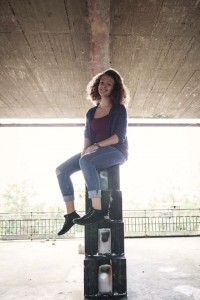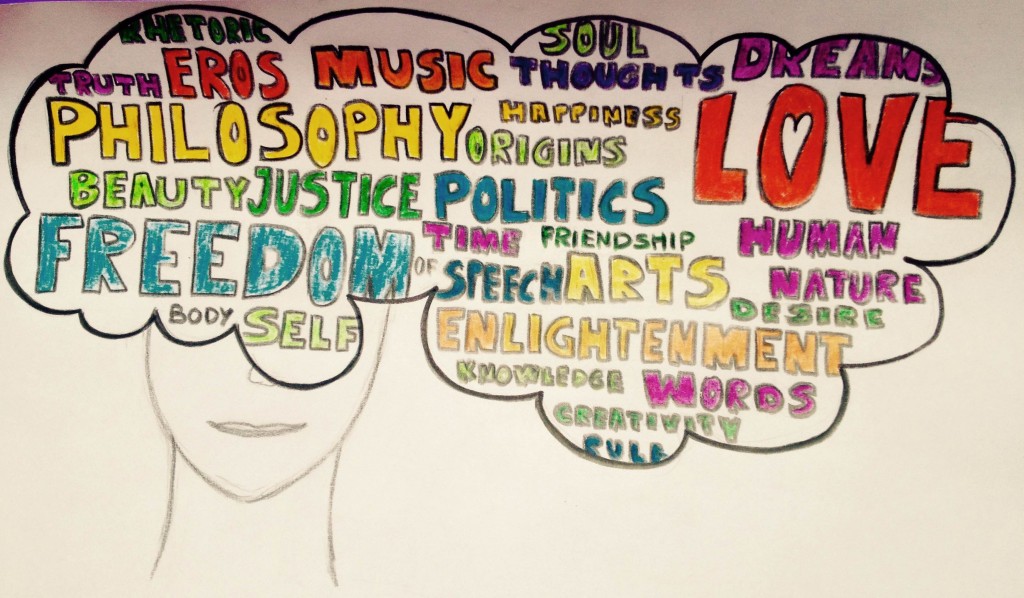My first semester at Bard College Berlin just ended and I would like to write about the past few months and draw on my first insight into a liberal arts education.
At first, many people advised me not to study at a liberal arts university. In Germany you usually choose a field of study that is already very fixed in its subjects and then you can specialize after a few years of studying that one thing. As a person who would like to know everything about (nearly) everything, I felt out of place in this system. I was not able to reduce my interests to simply one area. After I graduated from a German school, my only wish was to sit in a library, stay there for hours, and just read every single book that seemed interesting. But of course life happened and it took me one year to make this dream become partly true (in my imagination it was not as exhausting and frustrating to get some reading done as it is in reality sometimes).
A lot of people said: “What do you want to do with this education? We do not need more people who only talk and talk for hours and never act. The world is full of these. Why don’t you study something useful, something with which you can make money and not live in a trash can out of necessity?” What those people do not realize is that the philosopher Diogenes lived in a large ceramic “can” because he believed it was necessary to be independent from material needs and to think beyond social and bodily constraints. But his example was not the reason why I went to Bard College Berlin, despite all the warnings. I always wanted to make the world a better place, but I soon became aware of the fact that one first needs to know about the world, about human nature, and about society before one can claim: “I am going to change the world now!” (Even though I have no idea where to start.) So this is why I am here at Bard College Berlin. I want to know more about myself and the world I live in.
I can still remember my first phone call with my German friends after my first day at the college. “What the hell have I been thinking? What am I doing here? I am now in this big city far away from my family and my friends. I decided to live with all these college kids, who think of themselves as artists, poets and future intellectuals, and who all want to save the world. I need to go home and do something useful!” My friend simply laughed: “So what’s your point?” – she replied. “You think of yourself as an artist and a poet, too. You want to read as many things as possible, discuss them and then publish sophisticated articles about your thoughts. Moreover, you are also one who is very excited about changing the world. This is the right place for you to be.” Then there was nothing left for me to say. Okay, I thought, nowadays time flies by very fast, so four years will be over in the blink of an eye and then there is still enough time for me to do something useful afterwards…
My first day in the Language & Thinking Program was challenging and exhausting. So much thinking, so much reading, so much writing. I was torn between loving it––it was what I had dreamed of––and hating it because it caused me a terrible headache. Some texts are really difficult to read in your native language, but it gets even more confusing when you read it in a language you are not confident about. So sometimes (and this still happens to me) I was in class and had the feeling that I read a different text because I thought it was about something totally different. It is fascinating how many meanings one simple word can have and how these different meanings can change your whole understanding of the text.
After a very frustrating first week, I was pretty sure that I would not be able to make it through this semester. In my head there were a thousand or maybe more plans of what to do instead. I have to admit that I wanted to do something easier, something which I already was able to do. I talked to my professor about the voice inside my head that did not stop telling me to give up. He reassured me that everyone has difficulties in the first semester to acclimatize to college life and that these struggles do not mean that I do not have what it takes. I felt more at ease after this talk but still was intimidated by my fellow students. Everything seemed so easy for them, while I was still unable to translate my jokes into English promptly, so that people would actually laugh and not be terribly bored because it took me so long to find the right words and come to the punch line.
I became friends with Riley, a girl from Washington, who read out loud some of my books to me and helped me get my work for classes done. She listened to me patiently and the more we kept talking, the easier the English words came to my mind. I had the feeling that the English-speaking Flavia and the German Flavia became more alike. I was able to make some great memories with my fellow students dancing, crying over essay deadlines, and baking pretty amazing cookies. I am very glad that I was able to meet so many open-minded and lovely people, hear so many interesting life stories, and refute my stereotypic idea of Americans. Soon I realized that everyone was struggling and that this was part of being a student. Everyone might reach a point where nothing is working out and nothing seems to make sense anymore. Everyone is doubtful sometimes and wants to find a reason for his/her existence –– I guess that this is what we all share with the greatest philosophers of all time.

In the first lecture of our core course about Plato’s Republic another professor told us that knowledge was not the only thing that mattered in life. Whenever we shall find ourselves in front of a wall, he encouraged us to climb it, simply sit on top of it and observe the world on both sides. This lecture was not really encouraging me to continue with liberal arts, but now, after other lectures by the same professor, his words make more sense to me. Socrates’ well-known phrase “I know that I know nothing” might be confusing and discouraging at first, but it does not mean that we should stop trying to get closer to a state of knowing. Reading Plato was extremely inspiring, because the way people read and how they relate to Socrates’ philosophy varies a lot. I cannot really describe my experiences with Plato because then my readers will think I am obsessed with this ancient Greek lover of wisdom, who wrote down a dialogue that maybe never actually took place; a conversation held between a by then dead guy, who talked about the idea of the good to random people on the streets of Athens, and his interlocutors, during one whole evening and night.
In the seminars of the core course we could ask every question that came to our minds. There were no stupid questions. Some of the professors had an extremely beautiful sparkle in their eyes when questions were asked that they knew how to answer. Still it was difficult for me to verbalize my thoughts, but I soon noticed that not the language or the use of sophisticated words that no one really knew the meaning of were important––it was about being there, taking part in the discussion, reading the texts and sharing your thoughts with others. Even a very simple thought can be turned into something extremely inspiring that keeps people going.
Sometimes, mostly in the mornings, I cursed myself for living off campus, but on my long way back home I was always reminded how helpful this journey was to stay in the realm of “real life.” I guess it is very easy to get lost in the world of philosophy, so I was and I still am very glad that I live with two German students who keep me grounded and consider other things as important in life. Overall, I am happy with my living off-campus because on my 40-minute way to Bard College Berlin I pass by a lot of famous Berlin spots like Kurfürstendamm, Potsdamer Platz, and, of course, the subway station Brandenburger Tor. Every day I am reminded of how lucky I am to live and study in Berlin.
During winter break, I traveled to Rome with my German friend Hannah, with whom I became friends at Bard College Berlin. One day we were waiting in a long line to enter the Colosseum. The entry was 7,50 € per person for young adults and students. We had to show our student ID cards. The cashier asked us: “So, what exactly are you studying? What is liberal arts?” “Everything and nothing” I replied but the woman did not like my joke and gave me a very angry look. “It is politics, rhetoric, philosophy, literature and arts,” Hannah said politely. “Arts?” she asked and suddenly smiled. “Art students do not have to pay any entry fee at all. Here are your tickets. Have fun in the Colosseum!”. It seems museums and heritage sites hold students of liberal arts in high regard.
Time went by very fast, which I interpret as a sign that I had fun during this semester. I want to say thanks to everyone who encouraged me to come here and not to give up after the first two weeks. Still, a lot of people will think that a liberal arts education is not the best use of time, but I absolutely do not think so. Of course, I can never be sure what the future might bring. Maybe one day I will regret spending so much time with conceptual art, philosophy and questions of human existence. Right now I do not. And I am looking forward to continuing doing what I have always wanted to do next semester as well: thinking, reading, writing, and driving my friends crazy with only talking about philosophy and true wisdom.
Yes, this is the right place for me to be.

